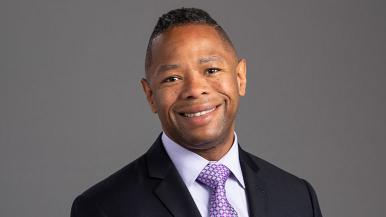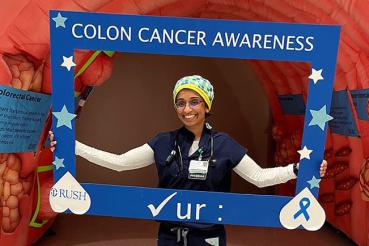When I was asked to share a few words about Black History Month, my first thought went to David Jones Peck, MD, a remarkable Black man in RUSH history. I learned about Peck through my involvement in the National Academy of Medicine's Roundtable on Black Men and Black Women in Science, Engineering and Medicine. Since coming to RUSH, I’ve discovered so much more about him.
Peck was the first Black person to earn a medical degree from an American medical school. That school was RUSH Medical College, and the year was 1847. To achieve such an accomplishment in the fiercely divided environment of pre-Civil War America was difficult and extraordinary. How did he do it? He used all the skills and talents his parents instilled in him, pursuing excellence with a deep sense of purpose.
Peck was the son of a prominent abolitionist, a minister in the African Methodist Episcopal church and the owner/operator of a successful barbershop in Pittsburgh. As any Black man knows even now, the barbershop is a gathering place for men in the Black community. It’s where we get the news along with our cut and a shave. In the 1840s and 1850s, it was also one of the only opportunities for a Black man to own a profitable business. I can imagine Peck as a teenager helping out in his father’s shop and learning from wise community elders about the struggle for freedom for Black people. Even as a teenager, such knowledge compelled him into action. He launched the Juvenile Anti-Slavery Society and engaged more than 40 other youths in the effort to break barriers to equality for Black people.
Peck may have developed his civil rights philosophy through talking with his father’s clients at the barbershop. His father and other members of the Black community were active supporters of the Underground Railroad in Pittsburgh. After Peck graduated from Oberlin College, these friends connected this smart young man to another stop on the railroad’s network: Chicago. And that’s how Peck was introduced to RUSH.
There’s an incredible story about Peck’s arrival at RUSH. Daniel Brainard, MD, RUSH Medical College’s founder, and other members of the RUSH faculty wanted Peck in the college. But some of his classmates vehemently objected because Peck was Black. Brainard argued in favor and then let the students vote.
The majority voted for Peck to stay, though a few other students were so opposed to sharing a classroom with Peck that they withdrew from medical school. Despite the challenges of being the only Black student in RUSH, Peck earned his medical degree in 1847, graduating at the age of 21.
Dr. Peck practiced medicine in Pittsburgh for a few years and then in Philadelphia, but the threats of the Fugitive Slave Act in 1850 and rumblings of civil war made him move to Nicaragua, a country some thought offered greater opportunity for equality. Peck died fighting against insurgents made up of disaffected U.S. Southerners who were intent on bringing slavery to Nicaragua. He was only 29 years old.
While I can’t say that my experiences are the same as Peck’s, I draw inspiration from his fight for social justice and equality. As any other Black person in America then or now, we all encounter the challenges of structural racism. I see our work in health care as one way we can make lives better for people of color in communities while advocating for needed investment toward health equity. I imagine David Jones Peck would agree.




